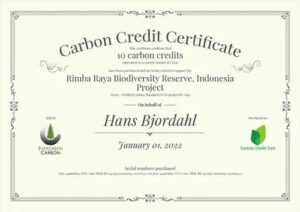Carbon Credit
Carbon Credit Exchange Certification is a market which is open to companies and individuals to buy and sell carbon credits. Several factors affect the price of these products. Depending on the type of project, the underlying project, and the attributes of the resulting credits, prices vary.
There are various types of projects that can be carbon credit exchange certified and issued tradable GHG credits. These can include industrial, community, and renewable energy projects. The latter are typically larger, and generate more GHG offset potential. They may trade at a premium to industrial projects.

There are also some emerging carbon credit exchanges. These markets are designed to ensure that quotas are met at the national and international levels, and reduce the financial impact of business. They also provide futures and spot markets for allowances and options. They have a strong infrastructure that supports post-trade activities, and can offer counterparty default protection.
Carbon Credit Exchange Certification
The voluntary carbon market is less regulated than the compliance market. Nevertheless, a number of regulators have discussed whether the voluntary carbon market should be globalized. This is a common concern among environmentalists and businesses.
The market is highly fragmented, with a high degree of complexity. This carries risks of fraud and lack of clarity. It is necessary to implement a standard for describing the characteristics of credits, and to ensure that buyers and sellers can find and market them properly.
A key issue with the voluntary carbon market is its lack of liquidity. In addition, participants can only purchase and sell credits once. This means that there are limited incentives to ensure quality. Fortunately, some of the most trusted organizations have set standards for verification and certification. The most popular of these is the Verified Carbon Standard (VCS), which was founded by a group of leading environmental and business leaders. The VCS includes a registry system, independent auditing, and accounting methodologies specific to different types of projects.
Traders and end users prefer standardized products. This helps to protect them from the accusations of greenwashing. They also ensure that basic specifications are followed. These types of products are particularly popular with finance players.
Some countries have developed national registries that can verify the emissions reduction of projects. These registries are then validated by the UNFCCC. The process is complex and requires long lead times. The result is that new credits are difficult to track. In some cases, this can lead to perverse incentives for poorly-vetted projects.
There are also many registries in the voluntary carbon market. However, a single centralized registry would prevent the proliferation of sub-par projects. This would reduce the costs involved in the issuance of new credits and shorten the time required for payment.
In addition, a digital process could streamline the issuance of credits. This could speed up cash flow for project developers and increase the credibility of corporate offsets. Ultimately, however, a consensus on the legitimacy of carbon offsets will be needed to ensure that they are used appropriately.